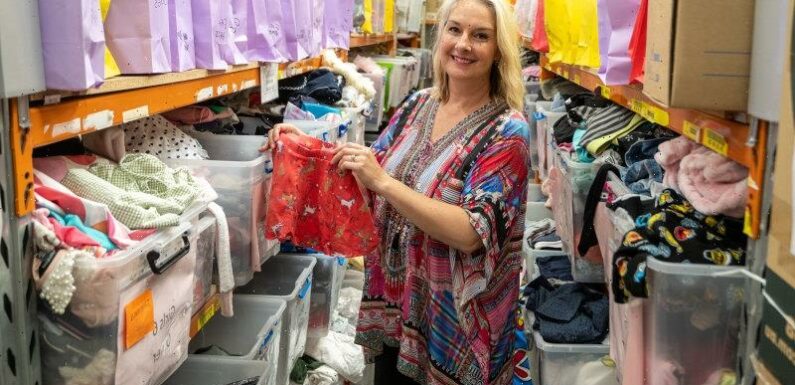
A charity that supplies thousands of disadvantaged children with free clothes and other essential items says high rental prices and low vacancy rates are hindering its urgent search for new, bigger headquarters.
Big Group Hug, which gives donated goods such as clothes, prams and nappies to clients across Melbourne’s north and west, must vacate its warehouse in Bundoora, in Melbourne’s north-east, by September.
Bursting at the seams: Big Group Hug chief executive Bernadene Voss at the charity’s Bundoora warehouse.Credit:Justin McManus
Chief executive Bernadene Voss said the landlords needed the space back.
She said if Big Group Hug could not find a big enough place within its budget, it may have to scale down operations, “which will mean children will miss out”.
The charity helped 5000 children in the past year, up from 4200 the year before. It is helping 500 clients a month.
Voss said more families were struggling financially as mortgage interest rates, rents and grocery prices rose.
“We’re starting to help families that have never needed charity before.”
She said Big Group Hug’s 400-square-metre warehouse in an industrial park behind Uni Hill shopping centre was “bursting at the seams”.
The charity is seeking an 800- to 1000-square-metre space in the northern suburbs with an office and roller door.
If no one can donate a space, Big Group Hug can pay rent of up to $60,000 a year, but it has only been able to find sites asking at least $150,000.
Voss said vacancy rates were low and it was hard to compete in the market.
Voss with volunteers sorting donated items at Big Group Hug.Credit:Justin McManus
“It’s pretty desperate because we need to find something and we need to move. We need to at least have a new place by August and we’re running very close to that.”
Voss said anyone who provided or funded a new space would “feel good knowing that they’re helping a charity, knowing how many children are out there that have warm clothes, have shoes and books”.
While people who donate items can drop them off at the warehouse, Big Group Hug gives out secondhand goods solely through more than 100 welfare-related organisations including the Asylum Seeker Resource Centre, Anglicare, 39 councils, the Housing Department and hospitals.
More than 300 volunteers sort, clean, fix and pack donated goods to order.
Recipients include families who have fled domestic violence; households in which the breadwinner has lost their job; and those unable to afford coats or shoes for school.
One woman with a newborn baby did not have a pram and so could not go out of the house. An eight-year-old girl wanted to go on school camp but did not have suitable clothes, bathers, a towel or sleeping bag. Big Group Hug supplied her with a suitcase of supplies including toiletries.
A domestic violence survivor with six children had to move suburbs and set up a house but was not eligible for Centrelink to help buy clothes for her children because she was a New Zealand citizen.
Christine Reynolds, of Greensborough, one of 350 Big Group Hug volunteers, said it felt like every second request was for domestic violence survivors who often fled taking few material things.
“One hopped on a plane in Sydney [to Melbourne] with the clothes on her back and her child, who was about five. Where she got the fare from, I don’t know, but they arrived here with nothing. She did have a contact here that she could go to, but imagine – she left everything she knows in Sydney. It’s really sad.”
Asked why someone should help fund new premises, Voss said: “Because one in six children out there are living in poverty and the government are often not there immediately, so we’re there as that safety net to provide material aid, urgently, to families and children that need it.
“Every child deserves the best, and unfortunately that doesn’t always happen, but where we can, we make sure that they have, at least, the basics.”
The Morning Edition newsletter is our guide to the day’s most important and interesting stories, analysis and insights. Sign up here.
Most Viewed in National
From our partners
Source: Read Full Article

